| "Descrizione" by Frank123 (12058 pt) | 2023-May-07 12:16 |
Review Consensus: 10 Rating: 10 Number of users: 1
| Evaluation | N. Experts | Evaluation | N. Experts |
|---|---|---|---|
| 1 | 6 | ||
| 2 | 7 | ||
| 3 | 8 | ||
| 4 | 9 | ||
| 5 | 10 |
Kathon CG (Kathon®) è un composto chimico, una miscela di due isotiazolinoni eterociclici: methylchloroisothiazolinone e methylisothiazolinone inseriti nella formulazione in proporzioni approssimative di 3:1 e con Magnesium chloride e Magnesium nitrate come stabilizzanti. E' un marchio registrato di Rohm and Haas Company.
Si presenta in forma di liquido incolore trasparente.
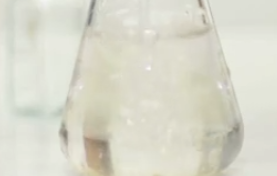
A cosa serve e dove si usa
E' un antibatterico non ossidante ad alta efficienza e ad ampio spettro, stabile a pH acidi e in ambienti più ossidanti. In commercio si trova con nomi diversi: Kathon 886, Kathon CG, Kathon LX ed altri.
Cosmetica
Conservante. Qualsiasi prodotto contenente composti organici, inorganici, acqua, ha necessità di essere preservato dalla contaminazione microbica. I conservanti agiscono contro lo sviluppo dei microrganismi dannosi e contro l'ossidazione del prodotto.
Alimentazione
Conservante chimico che evita la degradazione dei campioni di latte e mantiene l'autenticità dei risultati delle analisi.
Sicurezza
Dagli studi finora pubblicati a Kathon sono attribuite allergie da contatto, dermatiti da contatto (1) e, se inalato, malattia eosinofilia-mediata nel polmone (2)
Compendium of the most significant studies with reference to properties, intake, effects.
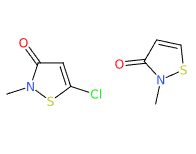 | 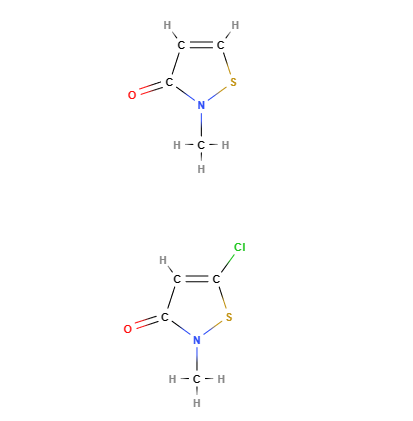 |
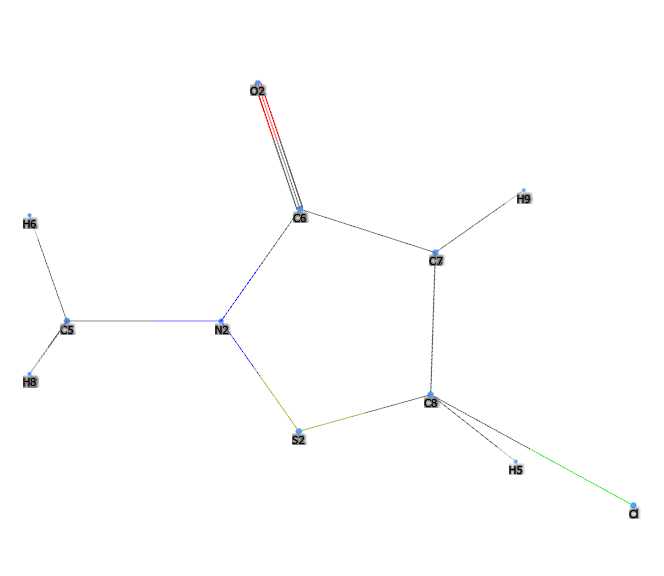 | 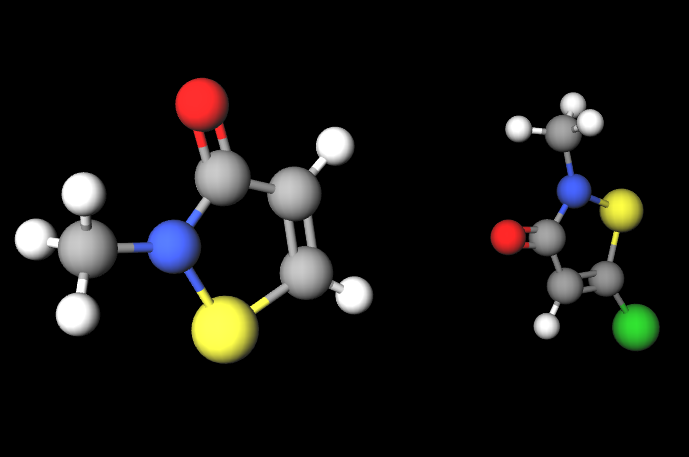 |
- Formula molecolare C8H9ClN2O2S2 C4H4ClNOS
- Peso molecolare 264.8
- CAS 55965-84-9 (Kathon 886), 5-chloro-2- methyl-4-isothiazolin-3-one (methylchloroisothiazolinone) 26172-55-4, 2-methyl-4 isothiazolin-3-one (methylisothiazolinone) 2682-20-4
- UNII 15O9QS218W
- EC Number 911-418-6 611-341-5 932-593-5 247-500-7
Bibliografia_____________________________________________________________________
(1) Kazandjieva, J., Gergovska, M. and Darlenski, R., 2014. Contact dermatitis in a child from methlychloroisothiazolinone and methylisothiazolinone in moist wipes. Pediatric Dermatology, 31(2), pp.225-227.
Abstract. Contact allergic reactions to methlychloroisothiazolinone/methylisothiazolinone also widely known as Kathon CG have been reported extensively reported. It is one of the most commonly used preservatives in rinse-off products, cosmetics, and others. Herein, a case of a 50-year-old girl is presented with chronic dermatitis in the anogenital area. The patient was patch tested and had positive reaction to Kathon CG. The detailed history taking revealed that the allergen was present in the moist cleaning wipes used instead of dry toilet paper. The presented case serves as a basis for a appraisal of the use of this preservative in wet wipes. In addition, the duration of the patch test protocol in children has also been discussed.
(2) Park, E.J., Han, J.S., Seong, E., Park, E.J., Lee, B.S., Lee, S.J. and Lee, K., 2020. Inhaled Kathon may induce eosinophilia‐mediated disease in the lung. Environmental toxicology, 35(1), pp.27-36.
Abstract. In 2011, a link between humidifier disinfectants and patients with idiopathic pulmonary fibrosis was identified in Korea, and Kathon was suggested as one of the causative agents. In this study, Kathon induced apoptotic cell death along with membrane damage at 24 h post-exposure. Additionally, on day 14 after a single instillation with Kathon, the total number of pulmonary cells and the levels of TNF-α, IL-5, IL-13, MIP-1α, and MCP-1α clearly increased in the lung of mice. The proportion of natural killer cells and eosinophils were significantly elevated in the spleen and the bloodstream, respectively, and the level of immunoglobulin (Ig) A, but not IgG, IgM, and IgE, dose-dependently increased. Therefore, we suggest that inhaled Kathon may induce eosinophilia-mediated disease in the lung by disrupting homeostasis of pulmonary surfactants. Considering that eosinophilia is closely related to cancer and fibrosis, further studies are needed to understand the relationship between them.
| Evaluate |

